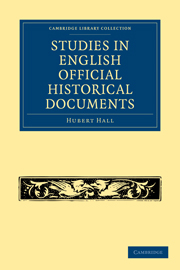Book contents
- Frontmatter
- PREFACE
- Contents
- ERRATA
- PART I THE SOURCES OF OFFICIAL HISTORICAL DOCUMENTS
- PART II THE DIPLOMATIC OF OFFICIAL HISTORICAL DOCUMENTS
- INTRODUCTION TO THE DIPLOMATIC STUDY OF OFFICIAL DOCUMENTS
- THE ANGLO-SAXON CHARTERS
- ANGLO-NORMAN CHARTERS AND WRITS
- LATER CHARTERS AND DIPLOMATIC INSTRUMENTS
- LETTERS, STATE PAPERS AND DEPARTMENTAL INSTRUMENTS
- ROYAL SURVEYS, INQUISITIONS AND ASSESSMENTS
- ROYAL ACCOUNTS
- JUDICIAL PROCEEDINGS
- APPENDIX I A Classified Table of Diplomatic Instruments
- APPENDIX II Early Diplomatic Criticism
- APPENDIX III The Charters of King Athelstan (Concordance of Formulas)
- APPENDIX IV Table showing the Relationship of the Pre-Conquest and Post-Conquest Diplomata
- APPENDIX V Documents connected with the Issue of the Great Seal (1662)
- APPENDIX VI Fees of the Seal
- APPENDIX VII Note on the Bibliography of English Diplomatic
- PART III THE PALAEOGRAPHY OF OFFICIAL DOCUMENTS
- TABLE OF MATTERS
INTRODUCTION TO THE DIPLOMATIC STUDY OF OFFICIAL DOCUMENTS
Published online by Cambridge University Press: 07 September 2010
- Frontmatter
- PREFACE
- Contents
- ERRATA
- PART I THE SOURCES OF OFFICIAL HISTORICAL DOCUMENTS
- PART II THE DIPLOMATIC OF OFFICIAL HISTORICAL DOCUMENTS
- INTRODUCTION TO THE DIPLOMATIC STUDY OF OFFICIAL DOCUMENTS
- THE ANGLO-SAXON CHARTERS
- ANGLO-NORMAN CHARTERS AND WRITS
- LATER CHARTERS AND DIPLOMATIC INSTRUMENTS
- LETTERS, STATE PAPERS AND DEPARTMENTAL INSTRUMENTS
- ROYAL SURVEYS, INQUISITIONS AND ASSESSMENTS
- ROYAL ACCOUNTS
- JUDICIAL PROCEEDINGS
- APPENDIX I A Classified Table of Diplomatic Instruments
- APPENDIX II Early Diplomatic Criticism
- APPENDIX III The Charters of King Athelstan (Concordance of Formulas)
- APPENDIX IV Table showing the Relationship of the Pre-Conquest and Post-Conquest Diplomata
- APPENDIX V Documents connected with the Issue of the Great Seal (1662)
- APPENDIX VI Fees of the Seal
- APPENDIX VII Note on the Bibliography of English Diplomatic
- PART III THE PALAEOGRAPHY OF OFFICIAL DOCUMENTS
- TABLE OF MATTERS
Summary
It has often been remarked that the Public Records of this country are unequalled throughout Europe in number and historical interest. To this observation we might add that amongst our Records those of the Chancery itself would be found to be in the most perfect state of preservation. This being so it is at first sight a matter of some surprise that such scanty information is available respecting the characteristic formulas of the national diplomata, especially as many causes were at work during the mediaeval period of our history to stimulate professional and individual interest in diplomatic criticism. But although the prerogative of the Crown and the welfare of the community were equally concerned in the purity and legality of the instruments which purported to issue from the early Chancery, it may at least be suggested that in too many cases no adequate scrutiny was applied to them.
The fiscal exigencies and the unabashed official corruption of the age will sufficiently account for many of these concessions. Moreover so far from being a presumptive object of distrust, a royal charter was something sacro-sanct in the eyes of mediaeval lawyers and officials. It is true that the hardy chronicler, in spite of a credulous acceptance (in the interests of his own house) of many impossible evidences of the royal favour, was capable of very shrewd reflections upon the character of the treasured muniments of a rival community.
- Type
- Chapter
- Information
- Studies in English Official Historical Documents , pp. 157 - 162Publisher: Cambridge University PressPrint publication year: 2010First published in: 1908



